Photographs: Norma Godinho
On a recent Saturday afternoon, the Celtics took on Magic, cheered on by raucous onlookers. The pace was quick, the players committed and the rivalry intense.
The participants, though, were not the storied Boston and Orlando basketball teams, but boys of the Mahindra-NBA recreational league in India, where the National Basketball Association (NBA) hopes to take advantage of the growing popularity of the sport to gain a foothold, backed by one of the largest corporate groups in the country.
India has famously been a one-sport country, with sponsors, audiences and even politicians obsessed with cricket.
Robust economic growth and greater exposure, however, have recently encouraged commercial and consumer interest in sports from soccer to Formula One motor racing and the Olympics.
"Cricket represents sports one through five in terms of popularity, but for us even a small slice of a billion-plus market represents real opportunity," said Adam Silver, NBA deputy commissioner, speaking in Los Angeles.
"What we're seeing in India is a burgeoning middle class, as well as a young population...we see an opportunity over time. It's hard to resist a population of that size."
Indian firms looking beyond cricket
Image: Former WNBA champion Teresa Edwards (left) and AC Green with participants at the Mahindra NBA challenge in MumbaiPhotographs: Norma Godinho
The annual seven-week basketball league, which tipped off in April, drew more than 1,000 eager applicants in Mumbai alone, with young boys and girls flaunting jerseys bearing the names of their more famous counterparts in the United States.
Mahindra and other Indian firms have long been patrons of sport, hiring sportsmen and sponsoring local teams, but they are now looking beyond cricket and even to Olympic glory.
"On the economic front, we're standing shoulder to shoulder with the best in most fields," said Shitin Desai, a vice chairman at DSP Merrill Lynch who is on the executive committee of Olympic Gold Quest (OGQ), a non-profit organisation run by sportsmen and business people.
"Corporates want to get involved because everyone has played and loved a sport at some point, and they feel proud when there is some achievement on the field. It's a great leveller."
Lakshmi Mittal kept aside $10 million to promote talent in India
Image: Abhinav BindraPhotographs: Reuters
Every four years, there is a great deal of hand-wringing and soul-searching about India's poor showing at the Olympics.
Failure has been blamed on everything from a culture that scorns sport as a career, to inadequate funds and facilities and sports federations run by bumbling bureaucrats and politicians.
India allocates about 35 billion rupees ($777 million) every year to sports, a tiny fraction of its $1-trillion GDP.
Steel baron Lakshmi Mittal, the fifth richest man in the world, put aside $10 million of his personal wealth in 2005 to promote sporting talent and encourage potential Olympians after he was disappointed by India's lone medal at the Athens Games.
Three years later, shooter Abhinav Bindra, backed by Mittal Champions Trust (MCT), won India's first individual gold in Beijing.
'What's really lacking in India is a plan, a vision'
Image: Vijender Singh (left) in action during a bout in MilanPhotographs: Reuters
While India's final haul of three medals paled in comparison to China's chart-topping 100, it was still a start.
"In India there's never been a plan, a strategy to identify and nurture talent, to build a pipeline of athletes," said Manisha Malhotra, a former tennis champion who runs MCT in Mumbai in close coordination with the Mittal family in London.
"At first we thought athletes only lacked money and I'd just have to sign cheques. But what's really lacking is a plan, a vision, the right knowledge, so we've had to study the system and get the best people to help with our athletes."
MCT supports 60 athletes in six disciplines - athletics, archery, boxing, shooting, squash and wrestling - working with national sports federations to select them, then providing equipment, coaches, physiotherapists, dieticians and training.
"Sport has survived on mediocrity with no accountability. Corporate involvement is key: it's not about money but cleaning the system, making it efficient, accountable, result-oriented," said Malhotra, who aims for five medals in the 2012 Olympics.'Our poor position in sports is an example of gap between intent and action'
Image: Chairman of the Selection Committee of the Athletics Federation of India, Gurbachan Singh Randhawa (right), is flanked by, (L-R) 1958 Commonwealth 400m gold medal winner Milka Singh, Indian national five times ladies squash champion Misha Soni, Olympic Gold medallist shooter Abhinav Bindra, hockey player Dilip Tirkey, British Olympian Kelly Holmes, English cricket player Monty Panesar and British Olympian Sebastian Coe during the CWG baton rally in LondonPhotographs: Reuters
Stories of mismanagement abound: the shooting federation threatened to boycott Beijing over inadequate ammunition, the men's hockey team went on strike over pay before the World Cup this year, and facilities for the Commonwealth Games in Delhi in October are well behind schedule and over budget.
The main failing was the inability to deliver on plans, said R Ramraj, who is on the executive committee of OGQ, the brainchild of billiards great Geet Sethi and all-England badminton champion Prakash Padukone, which backs 15 athletes in boxing, badminton, athletics and shooting.
"Our poor position in sports is one more example of a gap between intent and action, and that's why I think something like OGQ can help," said Ramraj, a senior adviser to Sequoia Capital, who along with Desai, wrote the first cheques for OGQ in 2006.
"The other difference is that OGQ is driven by sports people, who know the pride, the emotion of winning a medal, seeing the Indian flag being raised and the anthem being played in a foreign country. A bureaucrat or politician doesn't understand that."
'Sports will be part of India's continuous emergence'
Image: Indian footballer Sunil Chetri's recent move to play for Kansas Wizards in US is proof of India's growth in the sportPhotographs: Reuters
Even the most optimistic supporter admits it will be a long haul to sporting excellence and greater Olympic glory.
Corporates including Mahindra, which recently pulled the plug on a professional football league to launch a school-level football initiative, clearly have the chequebooks and expertise.
"As India continues to emerge on the world stage, sports is going to be a part of that. That's an enormous opportunity," said George Pyne, president of IMG sports and entertainment.
"Remember, you've got a billion people. That's three times the people in the United States. What you can do there with some good ideas...could be significant," he said in Los Angeles.

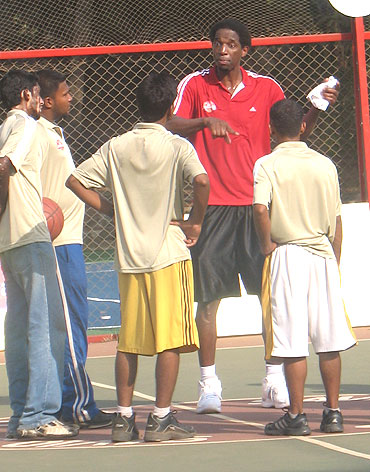
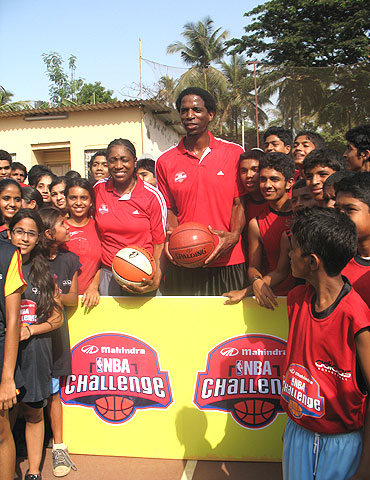
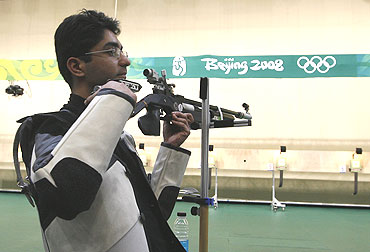
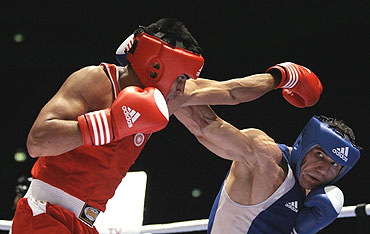

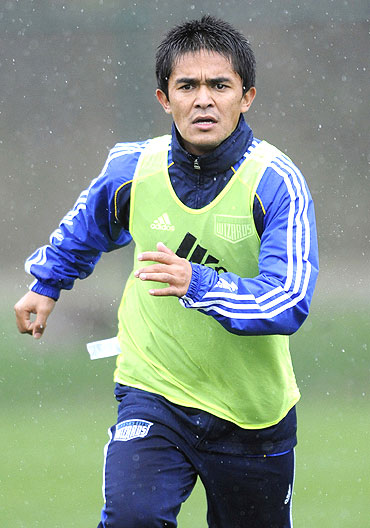

Comment
article